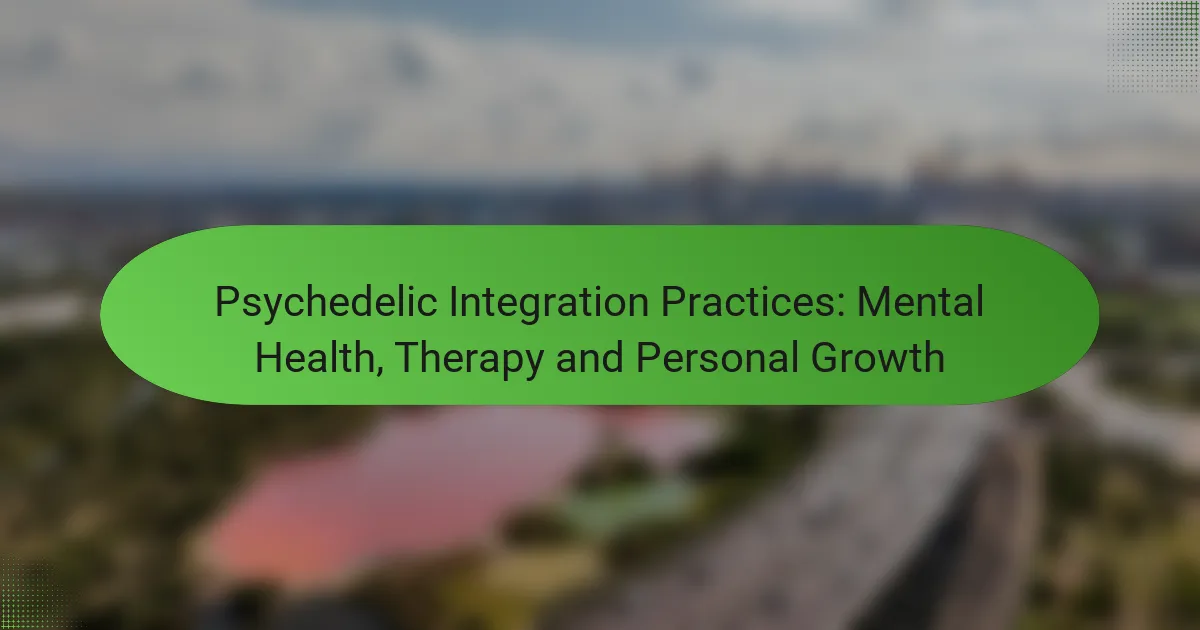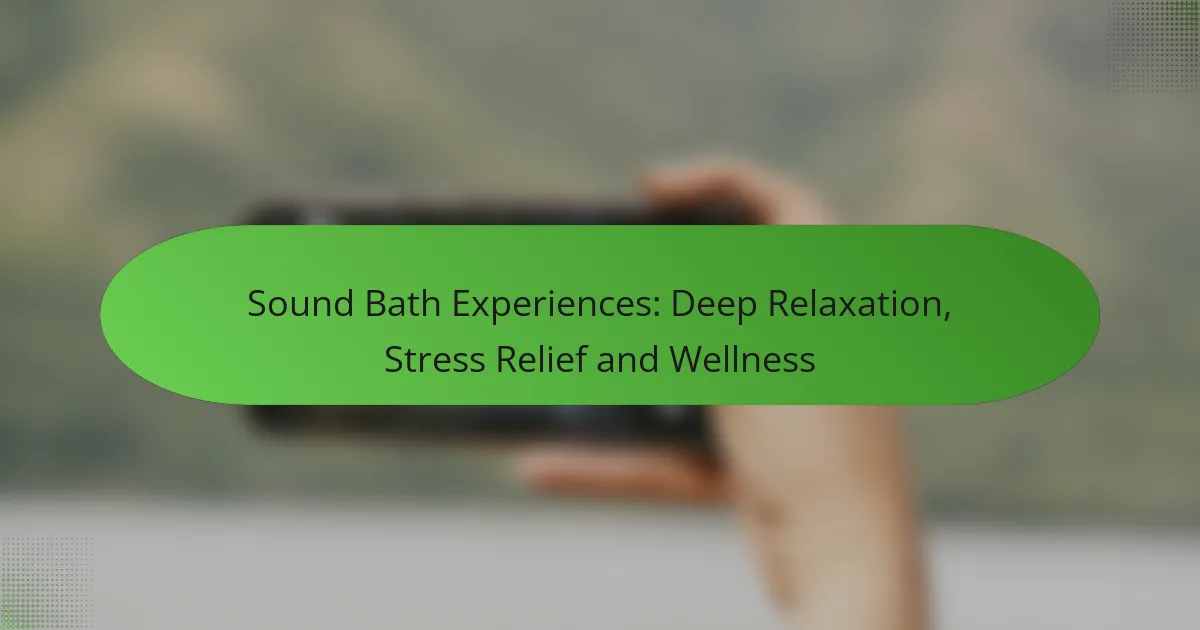Psychedelic integration practices are essential for individuals seeking to process the profound experiences and insights gained during psychedelic sessions. By enhancing mental health and supporting therapeutic processes, these practices facilitate personal growth and emotional resilience, ultimately leading to improved well-being.

What Are Effective Psychedelic Integration Practices?
Effective psychedelic integration practices help individuals process their experiences and insights gained during psychedelic sessions. These practices can enhance mental health, support therapy, and facilitate personal growth.
Therapeutic journaling
Therapeutic journaling involves writing down thoughts, feelings, and insights after a psychedelic experience. This practice can clarify emotions and foster self-reflection, allowing individuals to track their progress over time.
To get started, set aside time daily or weekly to write freely about your experiences. Focus on what you learned, any challenges faced, and how you can apply these insights in daily life.
Guided integration sessions
Guided integration sessions are structured meetings with a trained facilitator who helps individuals process their psychedelic experiences. These sessions can provide a safe space to explore emotions and insights while receiving professional support.
Consider participating in a session shortly after your experience, ideally within a week. This timing helps maintain the connection to your insights, making it easier to integrate them into your life.
Peer support groups
Peer support groups consist of individuals who share similar psychedelic experiences and provide mutual support. These groups foster community, reduce feelings of isolation, and offer diverse perspectives on integration.
Look for local or online groups that meet regularly. Engaging with others can help normalize your experiences and provide valuable insights into your personal journey.
Mindfulness meditation
Mindfulness meditation encourages present-moment awareness and can help individuals process emotions and thoughts from their psychedelic experiences. This practice enhances emotional regulation and fosters a deeper understanding of oneself.
Start with short sessions of 5 to 10 minutes daily, gradually increasing the duration as you become more comfortable. Focus on your breath and gently bring your mind back when distractions arise.
Creative expression techniques
Creative expression techniques, such as art, music, or dance, allow individuals to explore and express their psychedelic experiences in non-verbal ways. These methods can facilitate emotional release and deepen understanding of insights.
Try engaging in creative activities that resonate with you, whether it’s painting, playing an instrument, or writing poetry. Allow yourself to express freely without judgment, focusing on the process rather than the outcome.

How Do Psychedelics Impact Mental Health?
Psychedelics can significantly influence mental health by altering perception, mood, and cognitive processes. They have shown potential in reducing symptoms of various mental health conditions, enhancing emotional resilience, and improving overall mood.
Reduction of anxiety symptoms
Psychedelics, such as psilocybin and LSD, have been found to help reduce anxiety symptoms in individuals with anxiety disorders. These substances may promote a sense of connectedness and acceptance, which can alleviate feelings of fear and tension.
Research indicates that a single session with psychedelics can lead to noticeable reductions in anxiety, often lasting for weeks or months. However, the effects can vary widely among individuals, and it is essential to approach their use under professional guidance.
Enhancement of emotional resilience
Psychedelics can enhance emotional resilience by allowing individuals to confront and process difficult emotions. This process can lead to a greater understanding of personal challenges and a more profound capacity to cope with stress.
Practitioners often report feeling more equipped to handle life’s ups and downs after psychedelic experiences. Engaging in integration practices, such as therapy or group discussions, can further solidify these gains and help individuals apply insights gained during their experiences.
Improvement in mood disorders
Psychedelics have shown promise in improving mood disorders, including depression and PTSD. By fostering new neural connections and altering brain chemistry, these substances can provide relief from persistent negative thought patterns.
Clinical studies suggest that psychedelics can lead to significant improvements in mood, often within a few sessions. However, ongoing support and integration are crucial to maintain these benefits and prevent relapse into previous mental health issues.

What Role Does Therapy Play in Integration?
Therapy plays a crucial role in the integration of psychedelic experiences by helping individuals process their emotions and insights. It provides structured support that can enhance personal growth and mental health following such experiences.
Facilitating emotional processing
Therapy assists individuals in unpacking the complex emotions that may arise after a psychedelic experience. This processing can involve exploring feelings of joy, fear, or confusion, allowing for a deeper understanding of oneself. Techniques such as talk therapy, art therapy, or somatic practices can be employed to facilitate this emotional work.
Practitioners often encourage clients to articulate their experiences, which can lead to significant breakthroughs in self-awareness and emotional regulation. Journaling or expressive arts can also be effective tools in this phase.
Providing a safe space for exploration
A therapeutic setting offers a safe and supportive environment for individuals to explore their psychedelic experiences without judgment. This safety is essential for fostering openness and vulnerability, which are critical for effective integration. Therapists trained in psychedelic integration understand the nuances of these experiences and can guide clients through their exploration.
Creating a trusting relationship between the therapist and client is vital. This rapport encourages clients to share their thoughts and feelings freely, which can lead to more profound insights and healing.
Enhancing therapeutic outcomes
Integrating psychedelic experiences through therapy can significantly enhance overall therapeutic outcomes. Research suggests that individuals who engage in integration therapy report improved mental health, greater emotional resilience, and a more profound sense of purpose. These outcomes can be particularly beneficial for those dealing with anxiety, depression, or trauma.
To maximize benefits, clients should seek therapists with specific training in psychedelic integration. This specialized knowledge can help tailor the integration process to individual needs, ensuring that the therapeutic journey is both effective and meaningful.

What Are the Benefits of Integration for Personal Growth?
Integration practices following psychedelic experiences can significantly enhance personal growth by fostering deeper self-understanding and emotional healing. These practices help individuals process their experiences, leading to meaningful changes in behavior and perspective.
Increased self-awareness
Integration promotes increased self-awareness by encouraging individuals to reflect on their thoughts, feelings, and behaviors. This heightened awareness can reveal patterns that may have previously gone unnoticed, allowing for more conscious decision-making.
To enhance self-awareness, consider journaling about your experiences and insights after a psychedelic session. Regularly revisiting these reflections can deepen your understanding of yourself over time.
Improved interpersonal relationships
Through integration, individuals often experience improved interpersonal relationships as they gain insights into their communication styles and emotional responses. This understanding can lead to more authentic connections with others.
Practicing active listening and expressing vulnerability can strengthen relationships. Engage in open dialogues with friends or family about your experiences to foster deeper connections and mutual understanding.
Enhanced life purpose clarity
Integration can clarify life purpose by helping individuals identify what truly matters to them. Psychedelic experiences often shift perspectives, prompting a reevaluation of goals and values.
To harness this clarity, create a vision board or set specific, achievable goals that align with your newfound insights. Regularly assess your progress and adjust your objectives as needed to stay aligned with your evolving sense of purpose.

How to Choose a Qualified Integration Therapist?
Choosing a qualified integration therapist is essential for effective psychedelic integration, which supports mental health and personal growth. Look for professionals with relevant training, experience, and a therapeutic style that aligns with your needs.
Check credentials and experience
Verify the therapist’s credentials, including their educational background and any certifications in psychedelic therapy or integration. Many qualified therapists hold licenses in psychology, counseling, or social work and have completed specialized training in psychedelic integration.
Experience is equally important; seek therapists who have worked with clients undergoing similar experiences. A practitioner with several years in the field is likely to have developed effective strategies for integration.
Assess therapeutic approach
Different therapists may employ various therapeutic approaches, such as cognitive-behavioral therapy (CBT), somatic experiencing, or transpersonal psychology. Understanding their methodology can help you determine if it aligns with your personal goals and comfort level.
Consider asking potential therapists about their approach to integration sessions. A good integration therapist should be flexible and willing to adapt their methods to suit your unique experiences and needs.
Evaluate client testimonials
Client testimonials can provide valuable insights into a therapist’s effectiveness and style. Look for reviews that highlight the therapist’s ability to create a safe space, facilitate understanding, and support personal growth during integration.
While testimonials can be subjective, consistent positive feedback regarding a therapist’s approach and results can indicate their competence. Consider reaching out to former clients if possible, to gain a clearer picture of their experiences.

What Are Common Challenges in Integration?
Common challenges in integration after psychedelic experiences include difficulty processing emotions, navigating altered perceptions, and establishing lasting behavioral changes. These hurdles can hinder personal growth and mental health improvements derived from the experience.
Emotional Processing
Emotional processing can be a significant challenge during integration. Individuals may experience overwhelming feelings or unresolved issues that surface after a psychedelic experience. It is essential to create a safe space for these emotions, allowing time for reflection and understanding.
Practices such as journaling, therapy, or group discussions can aid in processing emotions. Engaging with a mental health professional familiar with psychedelics can provide valuable support and guidance.
Behavioral Changes
Implementing behavioral changes post-experience can be difficult. Many individuals struggle to translate insights gained during their psychedelic journey into everyday life. Setting realistic goals and small, actionable steps can facilitate this transition.
For example, if a person realizes the importance of mindfulness, they might start with a few minutes of meditation daily. Gradually increasing this practice can help solidify the change without feeling overwhelmed.
Community Support
Finding community support is crucial for successful integration. Connecting with others who have had similar experiences can provide validation and encouragement. Support groups or online forums can serve as platforms for sharing insights and challenges.
Participating in integration circles, where individuals discuss their experiences and support each other, can foster a sense of belonging and understanding. This communal aspect can significantly enhance the integration process.
Integration Therapy
Integration therapy specifically addresses the challenges faced after psychedelic experiences. This form of therapy focuses on helping individuals make sense of their experiences and apply insights to their lives. Therapists trained in this area can offer tailored strategies and coping mechanisms.
When seeking integration therapy, look for professionals with experience in psychedelics and mental health. This specialized knowledge can make a significant difference in the effectiveness of the therapeutic process.



